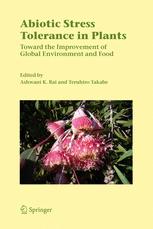

Most ebook files are in PDF format, so you can easily read them using various software such as Foxit Reader or directly on the Google Chrome browser.
Some ebook files are released by publishers in other formats such as .awz, .mobi, .epub, .fb2, etc. You may need to install specific software to read these formats on mobile/PC, such as Calibre.
Please read the tutorial at this link: https://ebookbell.com/faq
We offer FREE conversion to the popular formats you request; however, this may take some time. Therefore, right after payment, please email us, and we will try to provide the service as quickly as possible.
For some exceptional file formats or broken links (if any), please refrain from opening any disputes. Instead, email us first, and we will try to assist within a maximum of 6 hours.
EbookBell Team

5.0
80 reviewsStresses in plants caused by salt, drought, temperature, oxygen, and toxic compounds are the principal reason for reduction in crop yield. For example, high salinity in soils accounts for large decline in the yield of a wide variety of crops world over; ~1000 million ha of land is affected by soil salinity. Increased sunlight leads to the generation of reactive oxygen species, which damage the plant cells. The threat of global environment change makes it increasingly demanding to generate crop plants that could withstand such harsh conditions. Much progress has been made in the identification and characterization of the mechanisms that allow plants to tolerate abiotic stresses. The understanding of metabolic fluxes and the main constraints responsible for the production of compatible solutes and the identification of many transporters, collectively open the possibility of genetic engineering in crop plants with the concomitant improved stress tolerance. Abiotic Stress Tolerance in Plants is a new book with focus on how plants adapt to abiotic stress and how genetic engineering could improve the global environment and food supply. Especially, the application of biotechnology in Asia and Africa would be important. Environmental stress impact is not only on current crop species, but is also the paramount barrier to the introduction of crop plants into areas not currently being used for agriculture. Stresses are likely to enhance the severity of problems to be faced by plants in the near future.